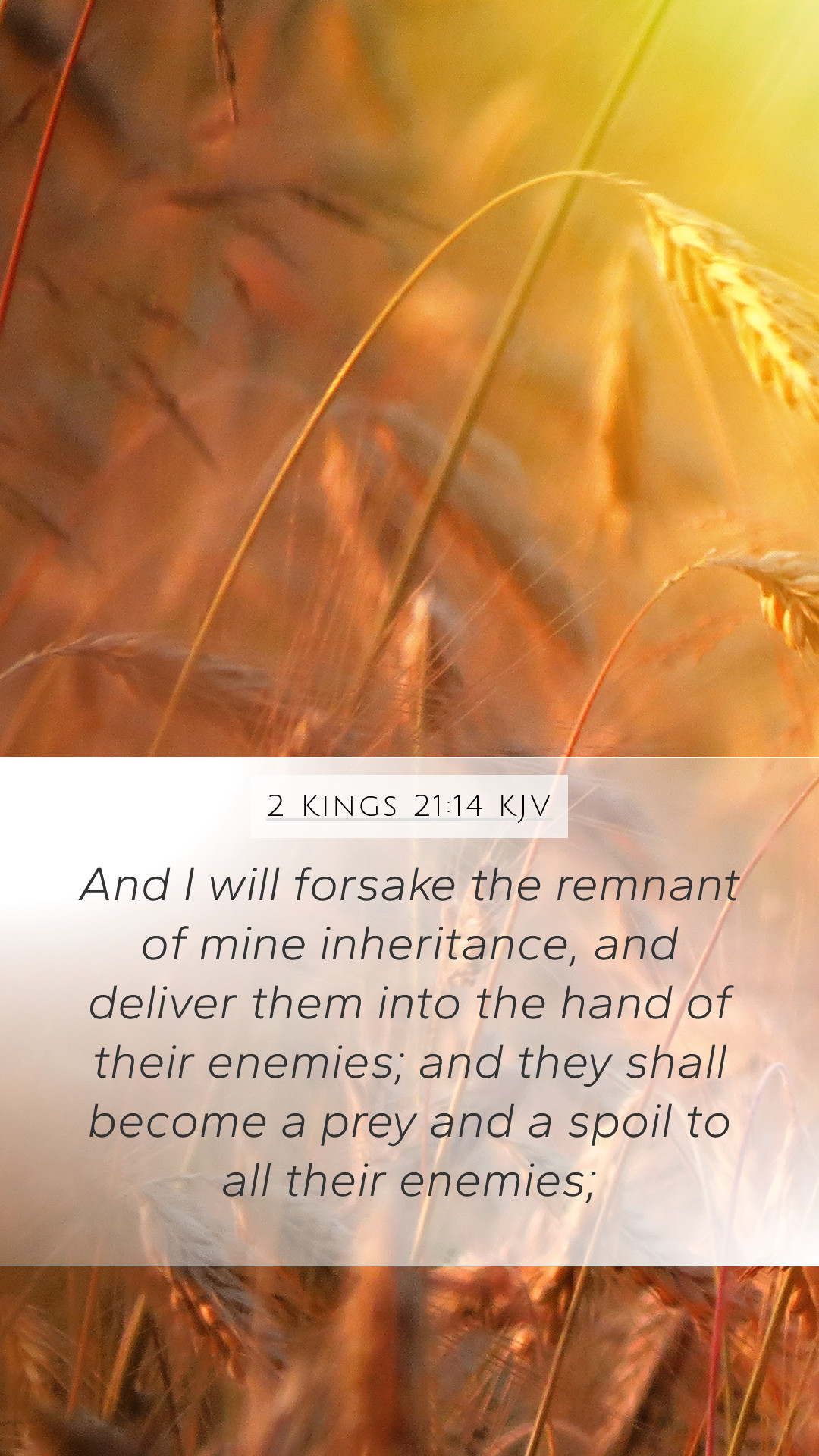Bible Verse Interpretation of 2 Kings 21:14
In 2 Kings 21:14, we find a profound insight into God's response to disobedience and the consequences of turning away from His commandments. This passage reads as follows: "And I will forsake the remnant of my inheritance, and deliver them into the hand of their enemies; and they shall become a prey and a spoil to all their enemies." This verse serves as a crucial point in understanding biblical themes of judgment, covenant, and restoration.
Exegesis and Commentary
This verse has been discussed by various commentators, who provide rich insights into its meaning and implications.
-
Matthew Henry:
Henry emphasizes the seriousness of Israel's infidelity through the kingship of Manasseh, noting that the consequences of their ways would lead to God's withdrawal of protection. He points out that God's forsaking of them signifies a severe judgment and highlights the painful reality of being abandoned by the Almighty.
-
Albert Barnes:
Barnes elaborates on the idea that the remnant mentioned is subject to loss and degradation due to their nation's sins. He asserts that this forsaking is not without purpose; it serves as a divine warning, contemplating the need for repentance and calling the people back to their covenant with God. The verse underscores the principle that sin ultimately leads the faithful to destruction if it persists.
-
Adam Clarke:
Clarke explains the historical significance of this judgment and describes it as a cumulative result of Israel's persistent idolatries. He points out that the remnant referred to is God's people who, despite the prevailing apostasy, remained. Clarke notes the gravity of the loss, suggesting that the forsaking mentioned is not a complete abandonment but rather a warning of what could happen if the people do not turn back to God.
Theological Implications
The significance of 2 Kings 21:14 extends beyond its immediate context, offering rich themes that resonate throughout the entire Biblical narrative:
- Judgment and Mercy: God's willingness to forsake a people who have turned away from Him illustrates a profound truth about divine holiness and justice. Underlining this is the promise of eventual restoration, ultimately pointing to the biblical theme of redemption.
- Covenant Relationship: This verse highlights the seriousness with which God views His covenant. The forsaking of His inheritance indicates a breach of that covenant, a vital concept for understanding the nature of God's relationship with His chosen people.
- Call Back to Repentance: Even in pronouncing judgment, there lies an implicit invitation to repent and return to God. The reminder of what they will lose serves to call the people back to faithful worship.
Cross References
This passage resonates strongly with several other scriptures, offering a myriad of insights and connections:
- Jeremiah 15:4: This verse mentions the judgment of God over the sinful ways of the people, reinforcing the themes of consequence and divine retribution.
- Isaiah 64:7: It reflects on the condition of God's people when they abandon Him, emphasizing spiritual destitution.
- Deuteronomy 28:25: Here, God outlines the blessings and curses associated with obedience and disobedience, echoing the sentiments found in 2 Kings 21:14.
Application for Today
The message of 2 Kings 21:14 carries vital lessons for contemporary believers regarding the importance of remaining faithful to God amidst distractions and cultural pressures:
- Personal Reflection: Consider areas in one’s life where God might feel distant and the need for repentance to restore that relationship.
- Community Responsibility: Engage in discussions within Bible study groups about the implications of collective sin and the necessity of corporate repentance in the church.
- Prayer for Restoration: Utilize this passage as a catalyst for prayer, seeking God’s mercy and guidance in areas where the church at large has strayed from His path.
Conclusion
2 Kings 21:14 serves as a sobering reminder of the potential consequences of turning away from God. Through insights obtained from esteemed commentaries by Matthew Henry, Albert Barnes, and Adam Clarke, we glean a deeper understanding of this verse's meanings, interpretations, and applications. This passage not only holds historical significance but also challenges us today to remain steadfast in our covenant with God, encouraging a life of faithfulness and devotion.


